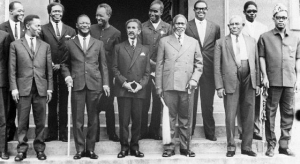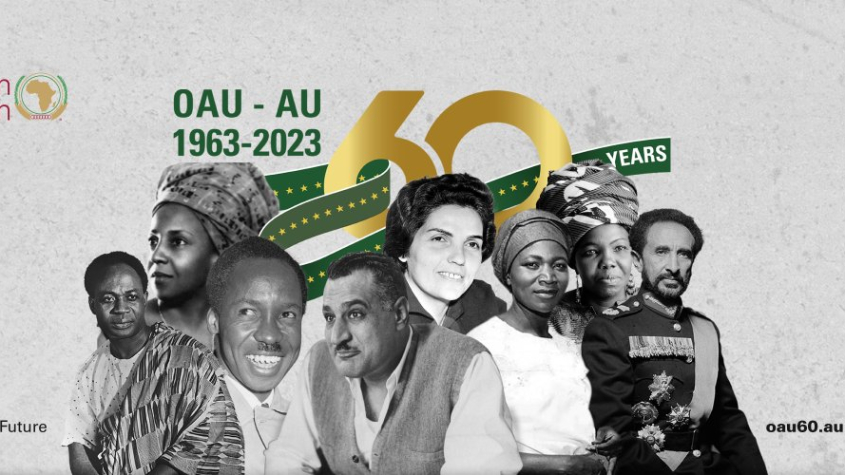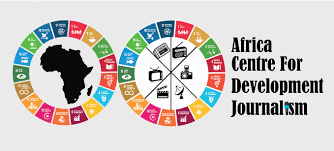OP-ED | On the significance of commemoration of OAU’s 60th anniversary, By Denise Kodhe
The 60th anniversary of the Organisation of African Unity (OAU) calls for reflection on the progress the continent has made, the challenges militating against its development, and how to build a better future for the continent.

On May 25, Africa celebrated the 60th anniversary of the formation of the Organisation of African Unity (OAU) now the African Union (AU). Every year, this date is celebrated by Africans at home and in the Diaspora as Africa Day, in memory of the founding fathers of the OAU who on May 25, 1963 signed a charter establishing Africa’s first continental institution, in Addis Ababa, Ethiopia.
Among the 32 heads of newly independent African states who signed the OAU Charter were Kwame Nkrumah of Ghana, Jomo Kenyatta of Kenya, Mwalimu Julius Nyerere of Tanzania and Haile Selassie of Ethiopia, whose desire was liberating the people of Africa from the shackles of colonialism and apartheid as well as forging unity and development on the continent.
The OAU had been instrumental in liberating African countries from European colonialism and ending apartheid in South Africa. After successfully achieving its primary mandate of ending colonialism and apartheid, the continental body was transformed into the AU 2002 as a result of which it had since rededicated itself to promoting economic integration, socioeconomic transformation, peace and security as well as development on the continent.
This moment truly calls for reflection on Africa’s journey since independence in the 1960s and appraisal of the progress the continent has made, the challenges militating against its development as well as how to build a better future for the continent.
In this direction, various policies have been put in place to foster regional cooperation, boost intra-African trade and allow for free movement of African people, goods and services across the continent, through the Africa Continental Free Trade Area (AfCFTA) and the Free Movement Protocol (FMP). It is worthy of note that African leaders have shown commitment towards to changing the continent’s development indices for better as well as ensuring peace and stability.
Yet, a lot still needs to be done to address the challenges of violent conflicts, terrorism so as to silence the guns across Africa which is crucial for fostering peace and stability on the continent. The ongoing civil war in Sudan and other violent conflicts around the continent are a stark reminder that Africa still has a long way to go to finally silence the guns. To this end, the AU should rise to the occasion and provide the necessary leadership and guidance as per its Constitute Act.
Other teething challenges retarding the continent’s progress are endemic public sector corruption, the effect of climate change, unemployment among the youth, gross violation of human rights and lack of adherence to rule of law. For Africa to achieve sustainable and equitable development African leaders must prioritize addressing these challenges.
No doubt, the continent has lots of prospects for economic growth and development. To translate these potentials into tangible result, African leaders must religiously implement the provisions of the African Union Agenda 2063, the masterplan for transforming Africa into the global powerhouse of the future. Pundits believe Africa is no longer the dark continent that it was thought be.
However, African leaders must go beyond rhetoric by ensuring the continent progress to its next level of development. Dictatorships, arbitrary amendments of constitutions to stay in power beyond what is legally allowed, military coups resulting from failed leaderships and political power struggle as being witnessed in African countries like Sudan etc are serious drawbacks taking Africa back to its ‘dark continent’ days.
Beyond African leaders, non-state actors in the civil society, the private sector, professional groups, the media, and the academia must also join the vanguards of ensuring Africa is on the right path and moving in the right direction. They should become active players in the continent’s governance affairs and positively influence decision-making and policy formulation towards the successful realization of the famed Africa We Want.
Denise Kodhe is a former Presiding Officer of the African Union Economic Social and Cultural Council (AU-ECOSOCC) and Member of the Advisory Group of the African Human Security Index (AHSI). The views expressed in this opinion article are those of the author and do not necessarily reflect the editorial policy of African Newspage














